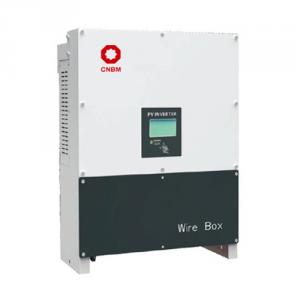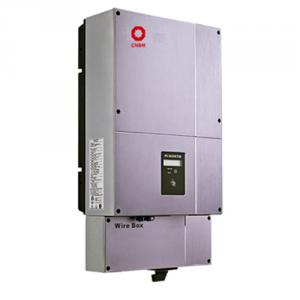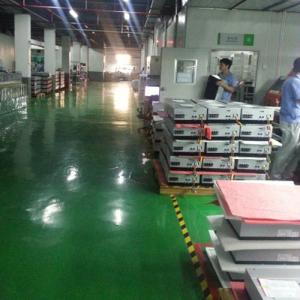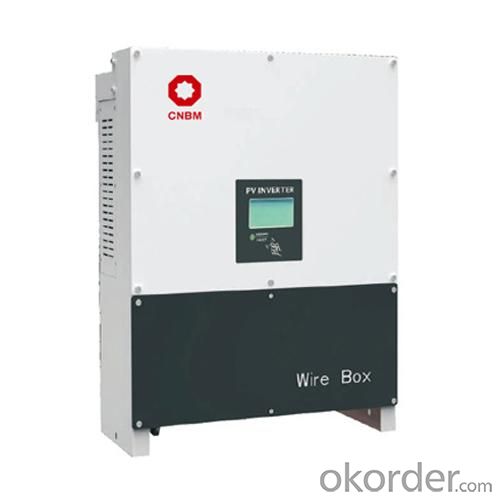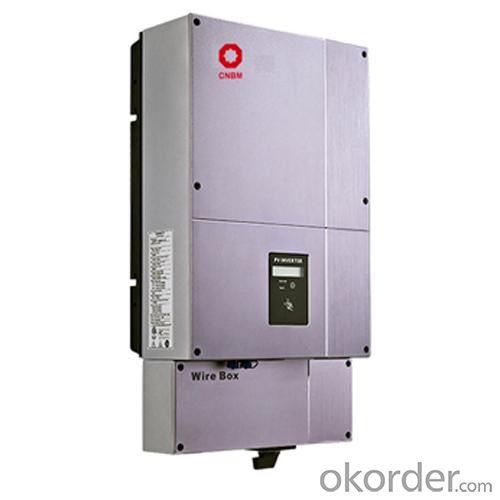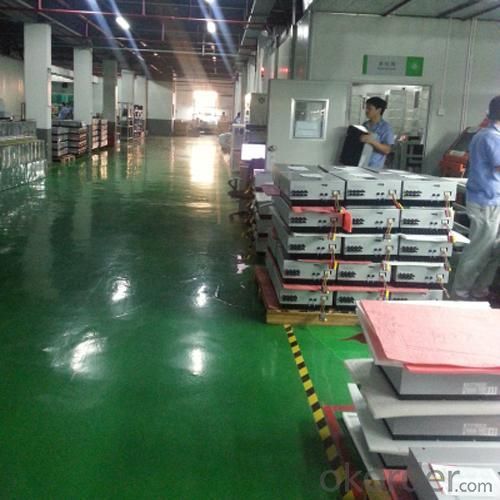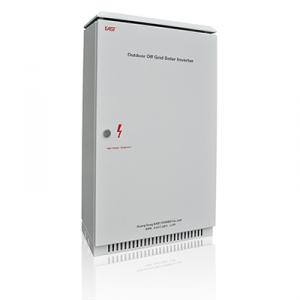Ta Solar Inverter 3-Phase Grid Tied 10000W
- Loading Port:
- Shenzhen
- Payment Terms:
- TT or LC
- Min Order Qty:
- 1 unit pc
- Supply Capability:
- 5000Units/Per month pc/month
OKorder Service Pledge
OKorder Financial Service
You Might Also Like
Grid Tied Solar Inverter 3-phase 10000W
CNBM International Corporation (CNBM International) is the most important trading platform of CNBM Group Corporation, a state-owned company under the direct supervision of State-owned Assets Supervision and Administration Commission of the State Council.
With a R&D team more than 100 engineers,40% of the staff, who has been deeply engaged in the photovoltaic industry for 10 years, CNBM takes the mission to increase the inverter availability and efficiency, putting continuous innovation to make CNBM inverter easier for installation and operation, and more cost-effective for solar plant construction. The full range of CNBM single phase inverters has received VDE, CE, G83/1, G59/2, ENEL2010, VDE4105, C10/C11, AS4777 etc.
Maximum efficiency of 97.8% and wide input voltage range, Internal DCswitch,MTL-String, Sound control,Bluetooth/RF technology /WiFiTransformerless,GT topology
The Grid Connected Solar Inverter we can offer is 1.5kw to 20kw.
Introduction of Grid Tied Solar Inverter 3-phase 10000W
Maximum efficiency of 97.8% and wide input voltage range
Integrated DC switch-disconnected
MTL-String
Sound control
Bluetooth/RF technology /Wi-Fi
Transformerless GT topology
5 years warranty (10 years as optional)
Datasheet of Grid Tied Solar Inverter 3-phase 10000W
Model | 10000TL3-US | 12000TL3-US | 18000TL3-US | 20000TL3-US |
Input data(DC) | ||||
Max. DC Power | 10500W | 12500W | 18750W | 20850W |
Max. DC voltage | 600V | 600V | 600V | 600V |
Start voltage | 120V | 120V | 120V | 120V |
PV voltage range | 80V-600V | 80V-600V | 80V-600V | 80V-600V |
Max. input current of the MPP tracker A/tracker B | 21A/21A | 25A/25A | 38A/38A | 42A/42A |
Number of MPP trackers/strings per MPP tracker | 2/3 | 2/3 | 2/6 | 2/6 |
Output data(AC) | ||||
Nominal output power | 10000W | 12000W | 18000W | 20000W |
Nominal AC voltage | 480V | 480V | 480V | 480V |
AC voltage range | 422-528VAC | 422-528VAC | 422-528VAC | 422-528VAC |
Nominal AC grid frequency | 60 Hz | 60 Hz | 60 Hz | 60 Hz |
Max. output current(cos φ=1) | 12.0A | 14.5A | 21.5A | 24A |
Power factor(cos φ) | >0.99 | >0.99 | >0.99 | >0.99 |
Harmonics | <3% | <3% | <3% | <3% |
Grid connection type | 3/N/E | 3/N/E | 3/N/E | 3/N/E |
Efficiency | ||||
Max. efficiency | 97% | 97% | 97.5% | 97.5% |
CEC-Weighted efficiency | 95.5% | 95.5% | 96% | 96.5% |
MPPT efficiency | 99.5% | 99.5% | 99.5% | 99.5% |
Protection devices | ||||
Input over voltage protection -DIN rail surge arrester(Option) | Class II | Class II | Class II | Class II |
DC insulation measure | yes | yes | yes | yes |
AC short circuit protection | yes | yes | yes | yes |
Output over voltage protection -Varistor | yes | yes | yes | yes |
Output over voltage protection -DIN rail surge arrester(Option) | Class II | Class II | Class II | Class II |
String fuse type/size(Option) | 15A/600VDC 10*38mm | 15A/600VDC 10*38mm | 15A/600VDC 10*38mm | 15A/600VDC 10*38mm |
General Data | ||||
Dimensions(W*H*D) in mm | 530*705*247 | 530*705*247 | 650*740*247 | 650*740*247 |
Weight | 46kg/101.5lb | 46kg/101.5lb | 63kg/138.9lb | 63kg/138.9lb |
Operating ambient temperature range | –25°C ... +60°C | –25°C ... +60°C | –25°C ... +60°C | –25°C ... +60°C |
Altitude | ≤2000m/6560ft | |||
Self Consumption night | < 3 W | < 3 W | < 3 W | < 3 W |
Topology | Transformerless | |||
Cooling concept | Fan Cool | Fan Cool | Fan Cool | Fan Cool |
Electronics protection rating /connection area | NEMA 3R | NEMA 3R | NEMA 3R | NEMA 3R |
Features | ||||
Display | Graphic | Graphic | Graphic | Graphic |
Interface:RS232/RS485/ Bluetooth/RF/Zigbee/Wifi | yes/yes/opt/opt /opt/opt | |||
Warranty:10 years /15 years | yes/opt | yes/opt | yes/opt | yes/opt |
Certificates and approvals | UL1741,UL1998,IEEE1547,FCC part 15(class B),CSA C22.2 No.107.1 | |||
Picure1: Factory of Grid Tied Solar Inverter 3-phase 10000W
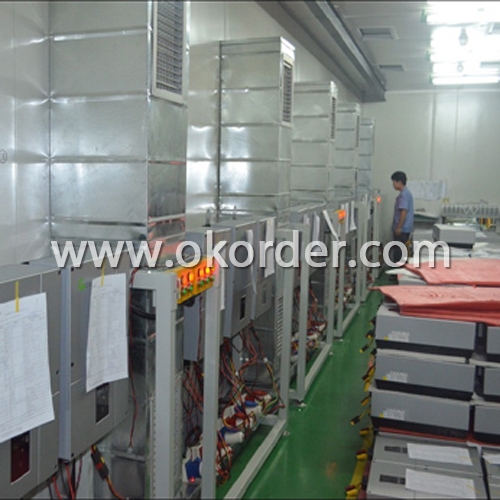
Picture 2: Package of Grid Tied Solar Inverter 3-phase 10000W
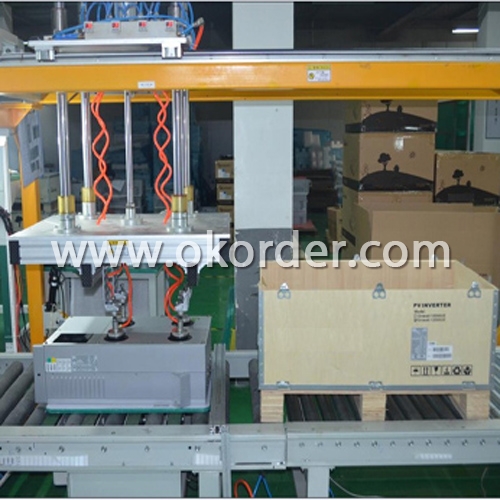
- Q: Can a solar inverter be used with different types of backup power configurations?
- Yes, a solar inverter can be used with different types of backup power configurations. Solar inverters are designed to convert the direct current (DC) power generated by solar panels into alternating current (AC) power that can be used to power homes or businesses. They can be integrated with various backup power sources such as battery banks, diesel generators, or grid-connected systems. This flexibility allows for uninterrupted power supply during periods when solar energy is not available, ensuring continuous electricity supply.
- Q: Can a solar inverter be used with a solar tracker system?
- Yes, a solar inverter can be used with a solar tracker system. The solar inverter is responsible for converting the direct current (DC) generated by the solar panels into alternating current (AC) that can be used to power electrical devices. The solar tracker system, on the other hand, adjusts the position of the solar panels to maximize sunlight exposure throughout the day. Both systems work together to optimize the efficiency and output of the solar power system.
- Q: How does a solar inverter convert DC power into AC power?
- A solar inverter converts DC power into AC power through a two-step process. Firstly, it uses a power electronic device called a converter to convert the DC input into a high-frequency AC output. Then, the high-frequency AC output is passed through a transformer to step up the voltage and convert it into standard AC power. This process enables the use of solar energy in applications that require AC power, such as household appliances or the electricity grid.
- Q: Can a solar inverter be used in areas with high levels of dust or pollution?
- Yes, a solar inverter can be used in areas with high levels of dust or pollution. However, it is important to regularly clean and maintain the inverter to ensure its optimal performance. Dust and pollution can potentially accumulate on the inverter's surface, affecting its efficiency and lifespan. Regular cleaning and maintenance will help mitigate any issues and ensure the inverter continues to function effectively.
- Q: Can a solar inverter be monitored remotely?
- Yes, a solar inverter can be monitored remotely. With the advancement in technology, many solar inverters are equipped with monitoring systems that allow users to remotely monitor and control their solar power systems. This can be done through various methods such as mobile apps, web-based platforms, or even through specialized software. Remote monitoring enables users to track the performance, energy production, and overall health of their solar inverters from any location with internet access.
- Q: Can a solar inverter be used with a solar water heating system?
- No, a solar inverter cannot be used with a solar water heating system. A solar inverter is designed to convert the direct current (DC) electricity produced by solar panels into alternating current (AC) electricity for use in the home or to be fed back into the grid. On the other hand, a solar water heating system uses the sun's energy to heat water directly, without the need for electricity conversion.
- Q: Can a solar inverter be used in regions with high levels of electromagnetic interference?
- Yes, a solar inverter can be used in regions with high levels of electromagnetic interference. However, it is important to ensure that the solar inverter is designed and manufactured to have proper electromagnetic compatibility (EMC) measures in place. These measures help to minimize the impact of electromagnetic interference on the operation and performance of the solar inverter.
- Q: Can a solar inverter be used for off-grid applications?
- Yes, a solar inverter can be used for off-grid applications. Off-grid systems typically rely on solar panels to generate power, and a solar inverter is used to convert the direct current (DC) produced by the panels into alternating current (AC) which can be used to power appliances and devices. The inverter also helps regulate the flow of electricity and ensure compatibility with off-grid power storage systems such as batteries.
- Q: Can a solar inverter be connected to a battery backup system?
- Yes, a solar inverter can be connected to a battery backup system. In fact, this connection is essential for storing excess solar energy generated during the day and using it during times when the sun is not shining, such as at night or during power outages. The battery backup system allows for uninterrupted power supply and greater energy independence.
- Q: Are there any government incentives or rebates available for solar inverters?
- Yes, there are government incentives and rebates available for solar inverters. These incentives and rebates vary by country and region. For example, in the United States, the federal government offers a tax credit called the Investment Tax Credit (ITC) that allows homeowners and businesses to deduct a percentage of the cost of a solar system, including inverters, from their taxes. Additionally, some states and local governments may offer their own incentives or rebates for solar inverters. It is recommended to check with local authorities or consult with a solar installer to determine the specific incentives and rebates available in a particular area.
Send your message to us
Ta Solar Inverter 3-Phase Grid Tied 10000W
- Loading Port:
- Shenzhen
- Payment Terms:
- TT or LC
- Min Order Qty:
- 1 unit pc
- Supply Capability:
- 5000Units/Per month pc/month
OKorder Service Pledge
OKorder Financial Service
Similar products
Hot products
Hot Searches
Related keywords
